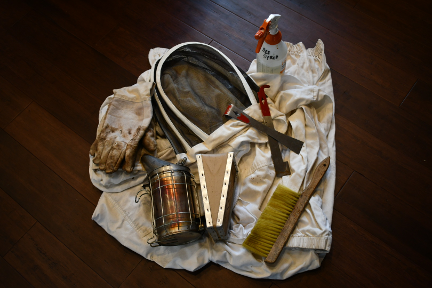This by no means is a complete list but is perhaps the minimum you should plan on having before your bees arrive in the spring. (Links below may contain affiliate links)
Five Essential Beekeeping Tools for the Beginner

1. Veil / Bee Suit – This one I personally would say is a no-brainer essential item. Especially for the beginner beekeeper. The last thing you want is getting stung in the head or face. All it takes is for one cranky hive to ruin a perfectly good day. It really comes down to personal preference for the style of the veil.
There are a few different styles available on the market. Everything from a simple veil without a hat clear up to complete suits is available. Most all types are easy to use but the ones that don’t use a complete jacket or suit require a little dexterity in tying them to ensure no “visitors” get inside. I personally use and prefer the whole-body suit with the European-style hood. But I also keep a fold-up square veil and hat handy for things like swarm retrieval should I not have my full suit.

2. Hive Tool(s)– When it comes to hive tools this really is two items. You will find having at least one of each handy. At a minimum, we recommend using one of the scraper/pry bar style and one with the J hook on the end. Each of these has their own advantages. The scraper/pry bar style is great for removing propolis and wax off part of the hive where you might not want it like the top of the frames. The J-Hook style is great for being able to lift the end of a frame out of the hive body.

3. Smoker – A hive smoker is probably one of the hardest-working beekeeping tools you will buy. Quality materials and construction are key to a useful and long-lasting smoker. Look for one constructed of stainless steel. An outside cage to minimize the risk of things touching the sides of the hit smoker is a must as well.
The bellows are one of the key components of a quality smoker. Mine is leather and has been holding up very well over the years. There are some nice smokers on the market today that have replaceable bellows. One important thing to look for is a “fire grate” that sits above the air inlet. Most usually come with this grate but I have seen some cheap ones without the grate. The grate helps to keep the burning material off the bottom of the smoker and provides an air space at the bottom. This minimizes the amount of material that can fall through the grate to the bottom of the smoker blocking the air entrance. It can be very frustrating trying to use a smoker with this issue.

4. Bee Brush – A bee brush is a very handy and needed tool. Whether it is a simple task of cleaning bees off your suit at the end of a hive inspection or urging a swarm you caught out of a box into a hive, a brush is essential.

5. Spray Bottle – You won’t find this item on too many essential beekeeping tool lists. But I really recommend a quality spray bottle. I use a heavy-duty one that even sprays upside down. I would not recommend one of those cheap ones from a discount store because it will get a lot of use and need regular cleaning. Why a spray bottle you might you ask? Well, I prefer not to use a smoker when I can. A 1:1 sugar syrup works well to calm the bees (see our post on this). And you get the benefit of not ending up breathing or smelling like smoke. Plus the risk of starting a fire with your smoker isn’t there. You can read more about not using smoke in our post: The Alternative to Smoking Your Bees: Leave Your Smoker at Home.
Conclusion
This list of tools is what we consider to be the five of the essential tools a beginning beekeeper should consider having in their toolbox. Finally, this is not the comprehensive list of tools a beekeeper should have. It is sort of a minimum starting point. We will cover additional tools for your toolbox in future posts.
Bonus Tool:

Gloves! A good pair of beekeeping gloves can come in handy. Especially if having bees crawling on your bare skin makes you nervous. I like my soft leather ones with cotton gauntlets that protect my wrists. You can also find ventilated gauntlet gloves as well as a variety of materials for the gloves themselves. It really comes down to personal opinion in my mind when it comes to style. Just remember, like the tools listed above, skimping on the price can lead to a short lifespan of your gloves. Good luck and happy beekeeping.
